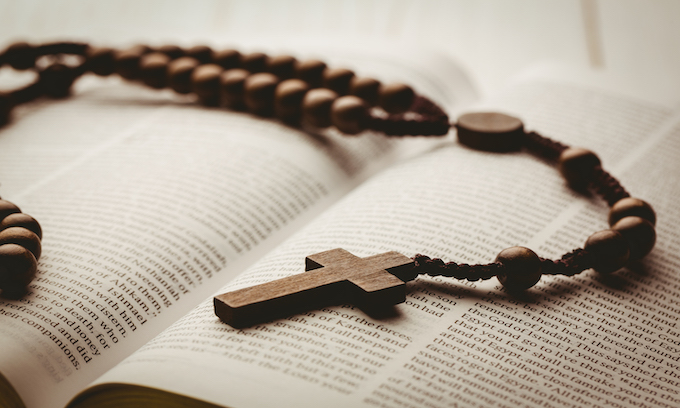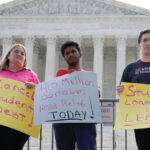Catholic school students and teachers who want to be identified by a gender other than their sex at birth could be dismissed from school or lose their jobs under new policies by the Archdiocese of Omaha.
The archdiocese is requiring its 70 schools to conform to Catholic teachings on gender identity. The new policies, which have been given to schools in recent weeks, will take effect Jan. 1.
The policies cover the use of pronouns, dress codes and participation in sports. They also ban “gender-affirming psychotherapy,” use of hormone medications or surgery that runs counter to Catholic tenets on human sexuality.
The archdiocese schools enroll about 19,000 students.
Endorsed by Archbishop George Lucas, the policies address how schools should respond to children experiencing gender dysphoria. The archbishop has authority over schools in the archdiocese on matters of faith.
The church defines gender dysphoria as involving “a conflict between a person’s physical gender/sex and the gender with which they identify.”
The policies also lay out how employees and volunteers in the schools are to conduct themselves regarding gender identity.
Under the policies, a student or prospective student experiencing gender dysphoria “should not be denied admission or be dismissed from [the school] for that reason, provided both the student and his or her parent(s) agree that the child will abide by the expectations and standards of conduct set” by the school.
Students could be denied admission or be dismissed from school “in the event the child’s parent(s) resists the school’s instruction to the child in the Catholic tenets respecting the human person and human sexuality.”
“A child whose parent(s) permits gender-affirming psychotherapy or administration of puberty-blocking or cross-sex hormone medications to such a child or authorizes sex procedures or surgery cannot be enrolled in [the school],” according to the policies.
In that case, parents would be given the opportunity to withdraw the child. If they did not, the school would dismiss the student.
“Respectful, critical questioning of Catholic teaching in the classroom is acceptable provided it intends to help the student progress toward greater awareness and understanding,” the policy template says. “Showing hostility toward or defiance of Church teaching demonstrates that a student is not a proper fit for the school.”
Students will be addressed with the pronoun that reflects their biological sex. They will also have to abide by the dress code and school uniform policy that corresponds with their biological sex.
Students’ eligibility to participate in competitive or recreational athletics, and single-sex activities, will be based on their biological sex.
Employees and volunteers will have to conduct themselves “in accord with their biological sex at birth at all times.” They will have to use names, titles and pronouns consistent with their biological sex.
Deacon Tim McNeil, a spokesman for the archdiocese, said that in the past schools and church leaders were provided guidance for handling gender identity situations. But he said local school leaders subsequently asked the archdiocese to provide specific policies.
“What’s been proposed should be of no surprise,” McNeil said. “The church has been clear. Pope Francis has been clear. Pope Benedict was clear. Pope John Paul II was clear about this. Catechism is clear.”
McNeil said the response from schools has been favorable.
“We have confidence that they will, with compassion, implement the policy. They want to partner with students. They want to partner with parents.”
In the earlier guidance, the archdiocese said, “the soul of man and his relation to God cannot be separated from the bodily expression of this identity,” it said. “One’s gender is determined by one’s biological sex; there can be no separation between the two.”
It said persons experiencing gender dysphoria “must be accepted with respect, compassion and sensitivity.”
McNeil said the archdiocese expects criticism over the policies.
The Trevor Project, an organization that advocates for LGBTQ youths, says such youths need support.
The organization reports that LGBTQ youths in affirming schools had nearly 40% lower odds of attempting suicide compared to LGBTQ youths in nonaffirming schools.
The organization also reported that supportive actions taken by parents and caregivers were associated with lower suicide risk among LGBTQ youths.
© Copyright (c) 2022 Omaha World Herald
—-
This content is published through a licensing agreement with Acquire Media using its NewsEdge technology.



















One’s relationship with God, is entirely between them and God.
One’s relationship with Satan is entirely up to them.
And one’s relationship with the immoral, demonic socialist Democrat party cult is Stupid and Destructive.
This immoral, demonic socialist Democrat party considers themselves gods (false gods) and have invented multiple genders and promotes and supports the LGBTQ abomination.
Genesis 5:1-2 When God created mankind, he made them in the likeness of God. 2 He created them male and female and blessed them. And he named them “Mankind” when they were created.
It is entirely up to the individual if they want to follow, obey and love God. 🙂
Or follow, obey and love the demonic Democrat Party’s false gods. 🙁
This is GREAT news!!!! I hope that others follow suit!!!
AND any who don’t, ARE NOT A CHURCH, but a cult of satan.
Genesis 5:2
“Male and female created he them; and blessed them, and called their name Adam, in the day when they were created.”
And on the 666th day Satan Created them, LGBTQ, with the help of fallen Angels and members of the Democrat Party of Power seekers, power through social dependency and liberal insanity.
Since Catholic schools are private schools they make the rules that comply with their teaching about God. Nobody is forced to go to their schools, so if one doesn’t want to follow those rules they have no business going there. At least some people in this country still believe there are only male and females in this world.
Good for Omaha and its Catholic school system. If you don’t like, don’t send your children to the Catholic schools. And publicly complain about Catholic schools not being “woke”. I hope/wish more Catholic schools would follow suit.